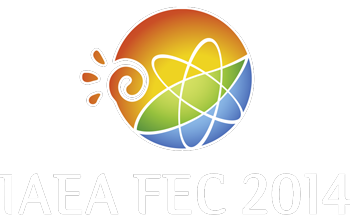Speaker
Mr
Mark Nornberg
(USA)
Description
Reversed Field Pinch (RFP) plasmas tend toward self-organized behavior depending on the nonlinear coupling between mutually interacting tearing modes. In multiple helicity plasmas one or more linearly unstable tearing modes may drive energy into stable modes through this coupling. In contrast, at high current and low density plasmas tend towards a state with a single dominant core mode. Although secondary modes are present, their amplitudes are reduced in this Quasi-Single Helicity (QSH) state. Recent work on modeling the shear-suppression mechanism has produced a predator-prey model of the QSH dynamics that reproduces the observed time dynamic behavior, in particular the increased persistence of the QSH state with increased plasma current. To diagnose these plasmas, we have established an error field control mechanism that locks the structure to a particular helical phase, to the advantage of the advanced diagnostic set on MST. With this diagnostic set, we have obtained evidence of helical structure in electron temperature, density, and impurity temperature.
| Country or International Organisation | USA |
|---|---|
| Paper Number | EX/P3-50 |
Author
Mr
Mark Nornberg
(USA)
Co-authors
Dr
Brett Chapman
(University of Wisconsin-Madison)
Dr
Daniel Den Hartog
(University of Wisconsin-Madison)
David Brower
(The University of California at Los Angeles)
David Terranova
(Consorzio RFX)
Don Holly
(University of Wisconsin-Madison)
Eli Parke
(University of Wisconsin-Madison)
Fulvio Auriemma
(Consorzio RFX)
Garth Whelan
(University of Wisconsin-Madison)
James Duff
(University of Wisconsin-Madison)
James Hanson
(Auburn University)
John Goetz
(University of Wisconsin-Madison)
Prof.
John Sarff
(University of Wisconsin-Madison)
Jon Koliner
(University of Wisconsin-Madison)
Dr
Liang Lin
(University of California Los Angeles)
Lucas Morton
(University of Wisconsin-Madison)
Mark Cianciaosa
(Auburn University)
Meghan McGarry
(University of Wisconsin-Madison)
Paolo Franz
(Consorzio RFX)
Paolo Innocente
(Consorzio RFX)
Prof.
Paul Terry
(University of Wisconsin-Madison)
Stefano Munaretto
(University of Wisconsin-Madison)
Weixing Ding
(UCLA)

